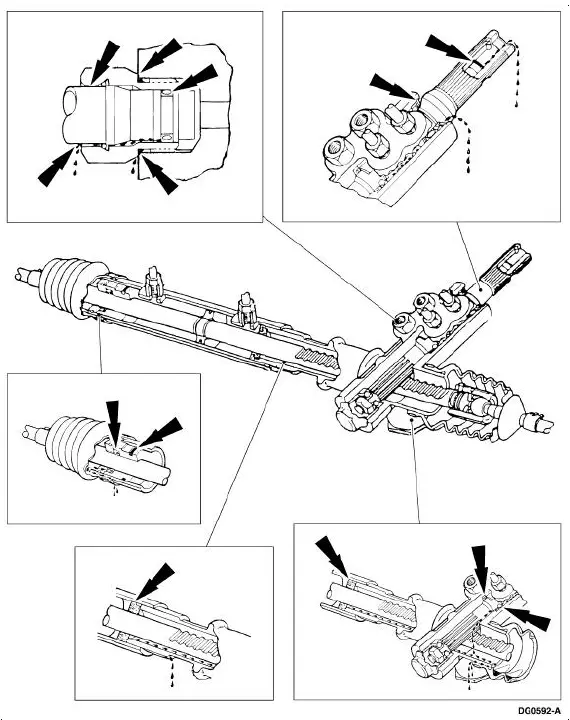Ford Mustang (1999-2004) Service Manual: Inspection and Verification
CAUTION: Do not hold the steering wheel (3600) at the stops for an extended amount of time. Damage to the power steering pump (3A674) will result.
NOTE: Make the following preliminary checks before repairing the steering system:
1. Verify the customer concern by operating the steering system.
2. Inspect Tires
- Check the tire pressure. Refer to the Vehicle Certification (VC) label.
- Verify that all tires are sized to specification.
- Check the tires for damage or uneven wear.
3. Belt and Tensioner Check
4. Fluid Level Check
- Verify that the power steering fluid level is within the appropriate indicated range, hot forthe 3.8L engine and cold for the 4.6L engine. Add Motorcraft MERCON Multi-PurposeATF XT-2-QDX or MERCON equivalent.
5. Air Bleeding
- Verify that there is no air in the power steering system. Run the engine (6007) until itreaches normal operating temperature. Turn the steering wheel to the left and rightseveral times without hitting the stops. If any air bubbles are present, refer to Purging-CII Power Steering Pump or Purging-CIII Power Steering Pump in this section.
External Leak Check - Typical Power Rack-and-Pinion Steering Gear

6. External Leak Check
- With the ignition switch at OFF, wipe off the power steering pump, power steering hoses, power steering fluid cooler (3D746) and steering gear (3504).
- With the engine running, turn the steering wheel from stop-to-stop several times. Do not hold steering wheel at stops. Check for leaks. Repair as necessary if leaks are observed.
7. Turning Effort Check
- Refer to Turning Effort Test under Component Tests in this section.
8. Visually inspect for obvious signs of mechanical damage; refer to the following chart.
Visual Inspection Chart
| Mechanical |
|
9. If an obvious cause for an observed or reported malfunction is found, correct the cause (if possible) before proceeding to the next step.
10. If the fault is not visually evident, determine the symptom and proceed to the following symptom chart.
 Steering System (Diagnosis and Testing)
Steering System (Diagnosis and Testing)
Special Tool(s)
Dial Thermometer 0-220F
023-R0007 or Equivalent
Hand Held Automotive Meter
105-R0053 or Equivalent
Power Steering Analyzer
211-F001 (014-00207) or
Equ ...
 Steering System Symptom Definitions
Steering System Symptom Definitions
Drift/Pull
Pull is a tugging sensation, felt by the hands on the steering wheel, that
must be overcome to keep the
vehicle going straight.
Drift describes what a vehicle with this condition does wit ...
Other materials:
Accelerator Cable - Supercharged Engine
Removal and Installation
1. Push the accelerator cable nylon bushing out of the accelerator pedal and
shaft arm.
2. Disconnect the accelerator cable from the throttle cam.
3. Depress the tabs and disconnect the accelerator cable from the bracket.
4. Rel ...
Spring Lock Coupling
The spring lock coupling is a refrigerant line coupling held together by a
garter spring inside a circular
cage.
When the coupling is connected together, the flared end of the female
fitting slips behind the
garter spring inside the cage of th ...
Transmission Draining and Filling
Material
Item
Specification
DEXRON III (ATF)
Transmission Fluid
XT-2-QDX
DEXRON III
1. Remove the drain plug and drain the transmission.
Position a suitable drain pan under the transmission.
2. Clean and install the drain plug.
3. N ...
